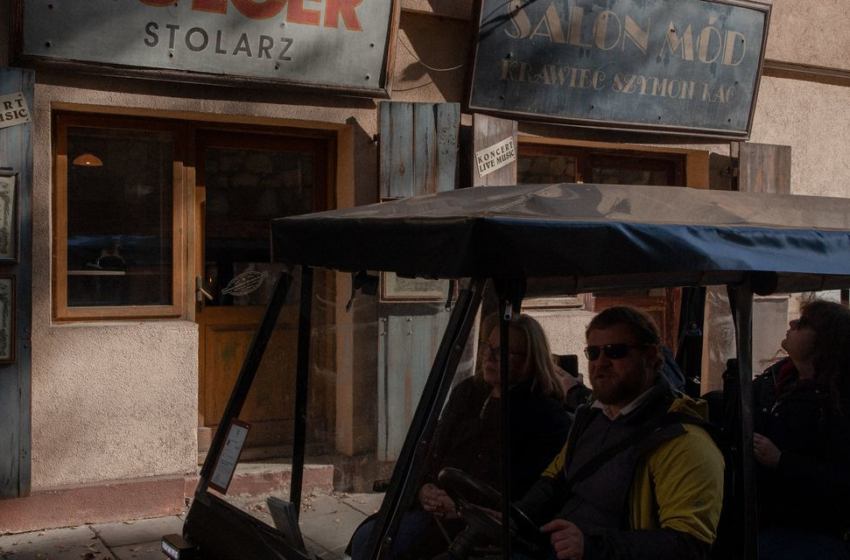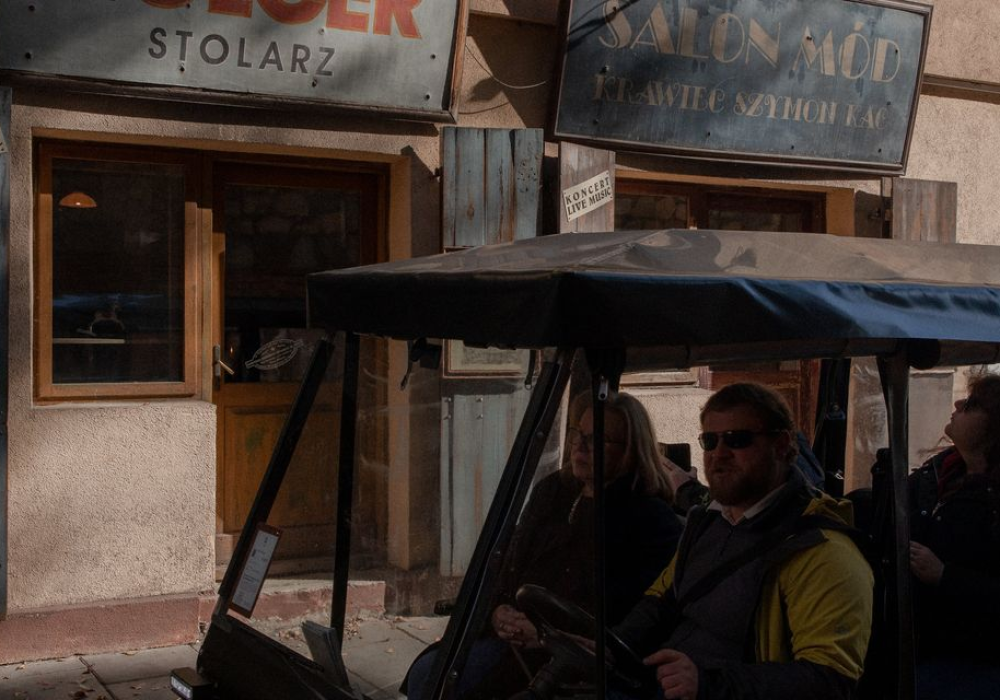KRAKOW, Poland—Olga Adamowska grew up with all the trappings of a Catholic childhood in Poland. She was baptized, and her family, though not very religious, had a Christmas tree every year.
But when she was 12, she began asking questions about her family history. Eventually, her mother told her that her grandmother was from a Jewish family.

Olga Adamowska grew up in a Catholic household but learned about her family’s Jewish history and is now a practicing Orthodox Jew.
Now, at 35, Ms. Adamowska, who grew up outside of Krakow, is a practicing Orthodox Jew.
Nearly 80 years after the Holocaust, a Jewish community is growing in Poland again.
Through deathbed confessions of elder relatives, genealogical research and, increasingly, DNA tests, thousands of Poles have discovered their Jewish roots.
But it remains an open question whether it is possible to bring back Jewish life in a place where a once-thriving Jewish community was nearly wiped out.
That question is especially pressing in Krakow, located just 50 miles from Auschwitz, the largest Nazi concentration camp.
“We’re next to the epicenter of the Holocaust,” said Jonathan Ornstein, president of the Jewish Community Centre of Krakow.

Jews evacuating from Krakow, Poland, in September 1940.
Photo:
ullstein bild/Getty Images

Auschwitz, the largest Nazi concentration camp, is just 50 miles from Krakow.
Photo:
Markus Schreiber/Associated Press
Far more Jews were killed in Poland than anywhere else during the Holocaust. In 1939, Poland was the center of Jewish life in Europe, with its roughly 3.5 million Jews representing a 10th of its population. In Krakow, a quarter of the city was Jewish.
Six years later, about 3 million of them had been killed. The vast majority of survivors fled the country.
Oppression of Jews continued under the postwar communist regime, with thousands stripped of their Polish citizenship in 1968 and forced to leave the country. Those who stayed largely hid their Jewish roots, including from their own children.
By 1989, only a few thousand practicing Jews were left in Poland, according to Michael Schudrich, the country’s chief rabbi, a New York native who moved to Poland in 1990.
Now, he said, there are at least 20,000 Poles taking some part in Jewish life, plus tens of thousands more who have Jewish roots but don’t know it.
But the more time passes, the harder it will be to help the children and grandchildren of survivors reconnect to Jewish life.

Jonathan Ornstein moved to Poland from New York in 2001 and opened the Jewish Community Centre in Krakow in 2008.
“We’re trying to see how many of these people we can reach,” said Mr. Ornstein, who grew up in New York but moved to Poland in 2001 and opened the JCC in Krakow in 2008. “There’s a window that’s open now, and we understand that window won’t remain open forever.”
When the JCC opened, Mr. Ornstein said, there were about 150 people engaged in Jewish life in the city, he said. Yet, interest in prewar Jewish life was everywhere.
Tourists from all over the world came to visit Auschwitz. They wandered through the cobbled streets of the old Jewish quarter, peeking into its seven historic synagogues, all of them still intact, and visited the factory of Oskar Schindler, whose efforts to save Jews here from concentration camps were dramatized in Steven Spielberg’s 1993 film, “Schindler’s List.”

Krakow’s old Jewish quarter is popular with tourists.
Along what was once the quarter’s main street, restaurants run by non-Jews today play traditional Klezmer music and put Stars of David on menus next to dishes they claim are traditionally Jewish—even though they are often not kosher. Non-Jewish Poles here organize the largest Jewish cultural festival in Europe.
After learning her grandmother was Jewish, Ms. Adamowska didn’t initially understand that she was Jewish as well—a common misconception in a country where many people have never met a practicing Jew and don’t know that Judaism is passed down matrilineally.
When the JCC opened, Ms. Adamowska was curious but hesitant to go inside. “I didn’t grow up Jewish; I didn’t speak Hebrew; I’d never been to a synagogue,” she said. She eventually began attending lectures at the JCC, where she found dozens of others who had the same experience she did.
To reach more people, Avi Baumol, a New York-born rabbi who splits time between Israel and Krakow, and Mr. Ornstein have tried advertising, putting up a billboard that invited Poles to explore their family history. But Rabbi Baumol said that it wasn’t effective—people had to explore their Jewish heritage when they were ready.
As he walks around Krakow wearing a kippah, locals approach him. “Wherever I was, I found people who were one degree separated from their Jewish identity,” he said.
Krakow’s Jewish community now numbers around 1,000 people, Mr. Ornstein estimates, though many take more part in cultural activities than religious services.
Even after discovering Jewish heritage, many Poles remain reluctant to identify as Jewish in a country where, for half a century, doing so put them in mortal danger. Ms. Adamowska said she often faces questions from visitors about why she stays here: “In Poland, you’re all the time in the shadow of the Holocaust.”
For several years her brother wore a Star of David necklace, but he has since turned away. Her mother acknowledges their Jewish heritage but doesn’t call herself a Jew.
At 84, Wiktor Bodnar, a Holocaust survivor, doesn’t tell all of his non-Jewish friends about his identity.
“I have friends who I meet at a sports club who say they could recognize a Jew from miles away. I don’t tell them,” he said.

Krakow’s Jewish community today is estimated to be around 1,000 people.
Jews in Krakow say they face little anti-Semitism today. But tension has grown between Poland and Israel since 2018, when the Polish government passed a law that prohibits blaming Poland for crimes committed during the Holocaust. Mr. Schudrich said the current government had also shown “a reluctance to condemn anti-Semitism clearly and forcefully.”
In a written statement, the prime minister’s office said, “Contemporary Poland remains a safe home for Jewish community,” adding that, due to the number of Poles killed during the Holocaust, “the Polish society and the state remains particularly sensitive to anti-Semitism.”
Increasingly, DNA tests are playing a role in discovering Jewish heritage.

Monika Wszołek learned of her Jewish heritage when she took a DNA test before the pandemic.
Monika Wszołek’s father made a confession to her when she was nearly 40 years old: He wasn’t sure the parents he had grown up with were his birthparents. Rumors had swirled during his childhood that they had found him during the war.
Shortly before the pandemic, they both took DNA tests. He was half Jewish; she was a quarter.
Ms. Wszołek has embraced her identity and encouraged her children to do the same. She bakes challah with them, and has brought them to the JCC, hoping they will grow up with the Jewish cultural heritage that she was missing.
But when her 9-year-old daughter wrote an essay for school about their Jewish heritage, Ms. Wszołek said, her husband feared anti-Semitic backlash. She told him they had to be open about it. “My real Jewish grandparents spilled blood on this land,” she said.

Shabbat dinner on a recent Friday at the Jewish Community Centre in Krakow.
For young Jews in Poland, there are opportunities that the previous generations didn’t have. In Krakow, the JCC has a preschool and a Sunday school. Two chapters of Hillel, a group for Jewish young people, operate across the country. Ms. Adamowska runs a group that visits schools to teach them about Jewish life.
At Shabbat dinner on a recent Friday night, about 40 people gathered in the JCC—attendance has been down during the pandemic. The group included Jews and non-Jews, Holocaust survivors and children. The children would be part of the first generation in more than 70 years to grow up in an openly Jewish community in Krakow, however small.

‘We have an obligation to keep going,’ said Zosia Radzikowska, a Holocaust survivor, of growing the Jewish community in Krakow.
“I would like that we were more, that we have more young people, that our choir was bigger, that there really was a Jewish community,” said Zosia Radzikowska, an 86-year-old Holocaust survivor. It would never reach the size it was before the war, she said. “But anyway, we have an obligation to keep going.”
Write to Ian Lovett at ian.lovett@wsj.com
Copyright ©2021 Dow Jones & Company, Inc. All Rights Reserved. 87990cbe856818d5eddac44c7b1cdeb8










